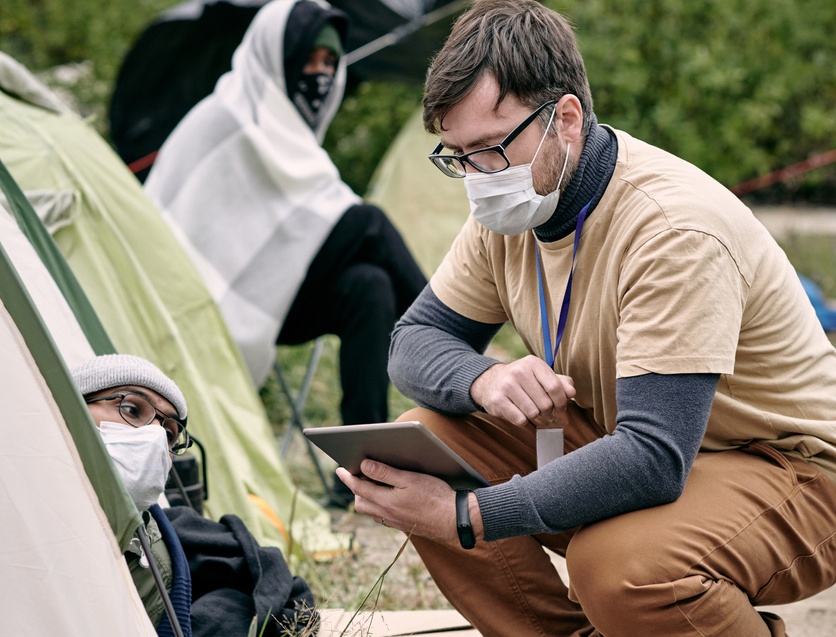Is There a New Energy in Volunteering?

Is a new energy emerging in volunteering?
That’s the belief of the authors of England’s new "Vision for Volunteering." It’s a vision over a year in the making and it sets out a national ambition for where volunteering should be in 2032.
This isn’t the only document seeking to shape the future of volunteering.
Earlier in 2022, Volunteering Australia started work towards a "National Strategy for Volunteering in Australia" while International Association for Volunteer Engagement (IAVE) has recently started work to update its 21-year-old "Universal Declaration on Volunteering." And most recently in June 2022, Volunteer Scotland published "Volunteering Action Plan," a follow-up to their "National Volunteering Framework" that sets out to bring about change in volunteering over the coming years.
And these are just four initiatives that we know about.*
We are, of course, encouraged to see all these initiatives to develop strategies, visions and plans to harness that new energy for a better future for us all. But why are these things happening now?
Emerging Energy Explained
The obvious reason to explain this new energy wave is that we are slowly emerging from the global COVID-19 pandemic. Whilst it’s far from over, for many, life has started to recover from lockdown, social isolation and the disruption of 2020 and 2021.
About the only good thing COVID-19 brought the world was an opportunity for individuals, organisations, communities and others to press a metaphorical big reset button. For example, now we don’t have to spend our working lives commuting to a downtown office, many are seeking hybrid working and ditching employers that won’t offer it, hence the so-called Great Resignation.
As we are fond of saying, volunteering doesn’t exist in a bubble, and so will not be immune to the changes happening around the world as we reset and readjust after more than two years of disruption. As the world and people’s lives change, so too must volunteering shift to fit within new ways of living, emerging priorities and values and ways of connecting.
Organizational Changes
It is timely for new strategies, visions and action plans to be developed to explore how volunteering needs to adapt in a post-COVID world. The examples we gave at the start of this article are at a national level, but we know this is happening at an organisational level, too.
For example, over the last two years, Rob has seen the balance of his work shift much more into consulting as organisations look for external support to consider how they will survive and thrive after the pandemic. He’s worked with a least half a dozen such clients since the summer of 2020, an unprecedented volume of such work in the 11 years he’s run his business.
Wise organisations, whether they involve volunteers themselves or support others to do so, know that the pandemic wrought big changes in volunteering. Online service became the norm, not the exception. Staff had to quickly learn to manage remote teams of volunteers rather than have them in the office. There was a greater public awareness of the power and value of volunteering as people stepped in to help when essential services were shut down. New attitudes to volunteers[i] emerged as people no longer questioned whether volunteers should be doing the same work as paid staff because, if they didn’t, vaccine roll outs wouldn’t happen as fast or at all. Of course, the opposite happened, too; in some situations, staff took over what were previously volunteer roles. Both scenarios present ethical challenges as the lines between who did what blurred; these will need addressing as the pandemic eases, and we encourage you to read Engage’s Ethics article from January 2022 to explore this topic further.
Volunteering Driven by Renewed Consciousness and Hope
Volunteering is, it could be argued, at an all-time high in public and organisational consciousness. This comes at an important moment as many organisation struggle to recover financially from the COVID years whilst also facing a cost-of-living crisis more significant than any since the 1970s. Fundraising our way out of trouble may not be an option this time round as real-terms incomes fall and living costs spiral ever higher.
And that brings us to the second reason we think these national strategies, frameworks and visions might be happening now, and at the very least why they are important — hope.
The world is in a very dark place right now. Russia’s invasion of Ukraine is creating shockwaves around the globe, causing energy prices to rocket and food supplies to become scarce. The climate crisis presents the biggest existential threat to humanity in our history. We won’t depress you with a longer list; you know the situation and how things are playing out for you locally.
Volunteering is perhaps a ray of light in our dark world. The simple act of giving just a little of your time to help someone else, to advocate for change, to fight against injustice, to make changes that matter, is incredibly powerful.
That’s why, for example, we are inspired by the approach taken in England’s "Vision for Volunteering." It doesn’t faff about with navel-gazing definitions of volunteering. It acknowledges the reality of the present and asks us to consider the actions and direction for the next 10 years. Powerfully, it puts volunteers at the heart of volunteering, orienting everyone to what is most vital, a positive, rewarding and impactful volunteer experience available to all.
Volunteering gives us hope. It gives us the hope that we can change the world for the better. It gives us inspiration when we see how others are making a difference, changing lives, saving lives and fighting for a fairer, safer planet.
Conclusion
All of which brings us back to the title of this Points of View: “Is there a new energy emerging in volunteering?” For us, the answer is obviously “yes.” However, perhaps there's a bigger question: “Is energy enough?”
Volunteerism exists within social institutions and power structures. So while many of these initiatives talk about making volunteering more inclusive moving forward, without buy-in and tangible actions from key powers within our society they run the risk of becoming nothing more than pretty words on paper. And that would be a waste of energy.
How would you suggest tackling the need for renewed vision, investment and changes to volunteering?
*If you know of other initiatives, please leave us a comment below with details and, ideally, a web link so we and others can find out more.


